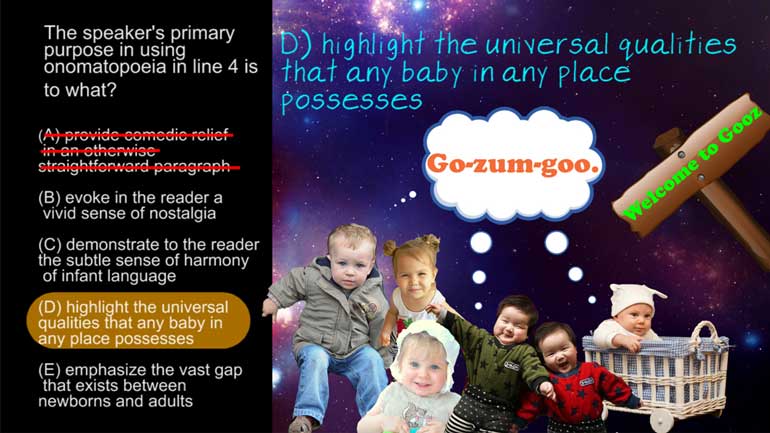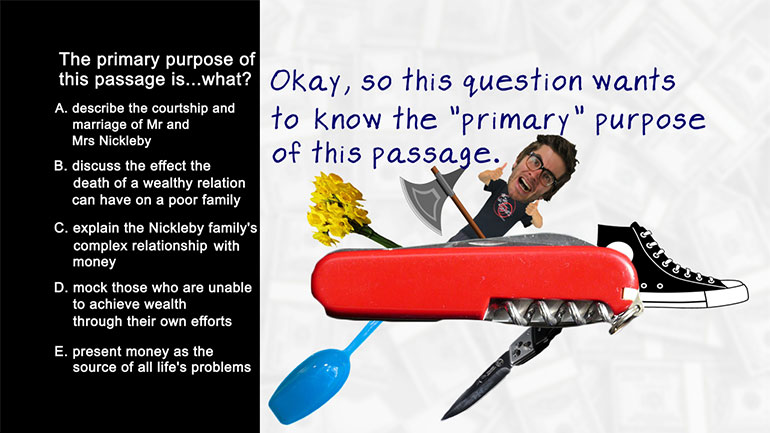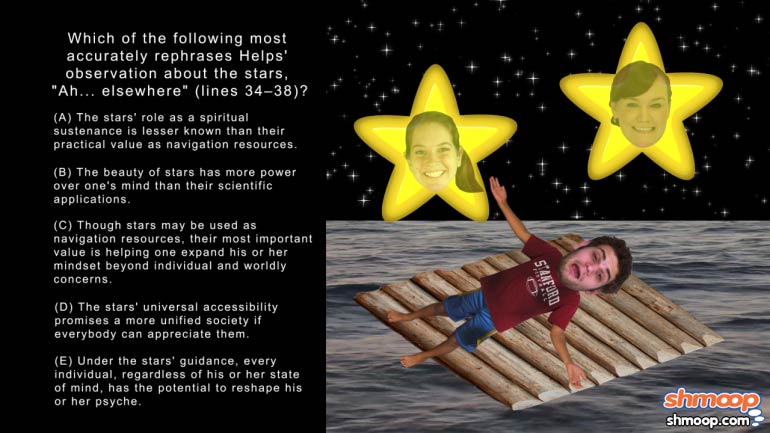ShmoopTube
Where Monty Python meets your 10th grade teacher.
Search Thousands of Shmoop Videos
AP English Language and Composition 7.10 Passage Drill 18 Views
Share It!
Description:
AP English Language and Composition 7.10 Passage Drill. The phrase "take this much trouble" refers to what activity or activities?
Transcript
- 00:04
And here's your shmoop du jour brought to you by trouble a
- 00:06
subject that Taylor Swift is very familiar with...alright check out the [Taylor Swift singing on stage]
- 00:12
following passage... Alright we're
- 00:16
moving on skim skim skiming and let's just get to it all right well here's
- 00:22
your question the phrase take this much trouble refers to what activity or
Full Transcript
- 00:26
activities and here are your potential answers... Okay let's start by clarifying
- 00:32
what take this much trouble means.. if someone takes the trouble to do
- 00:37
something that means the person made an effort in this instance the effort is
- 00:41
learning the general truths of zoological science specifically using [image of a bird on a laptop screen]
- 00:45
the common crayfish as an example well according to the author crayfish are
- 00:49
easy to obtain so if the reader won't even take the trouble to get one then he [Man reading book]
- 00:53
or she may as well close the book right now anyway since this is an illustrated
- 00:58
book the author definitely would not agree that verbal description alone is
- 01:02
sufficient for learning so A) is out observing a crayfish be a field trip is
- 01:06
one way to learn about the Crustaceous creature and you can take it a step
- 01:09
further by dissecting a crayfish if you have the stomach for it that is however [people dissecting a crayfish]
- 01:14
those are only two examples of how to study this yummy thing, answers D) and E) are
- 01:19
two specific so we can toss them into the sea looking at the books illustrations [Finger points to crayfish]
- 01:23
is a great reference to supplement the reading without a doubt pictures are
- 01:27
more helpful than learning by text alone but using the real thing is even better [Person holding a crayfish]
- 01:30
the author says that knowledge is best acquired by reading and firsthand
- 01:35
observation that means our answer is C) sensory impressions can't be beat when
- 01:39
it comes to zoological science sight, touch, hearing, smell, and even taste [Person touching a crayfish]
- 01:44
Taylor Swift puts it best... [Taylor Swift singing]
Up Next
AP English Language and Composition: Passage Drill Drill 1, Problem 2. What is the speaker's primary purpose in using onomatopoeia in line four?
Related Videos
AP English Literature and Composition 1.1 Passage Drill 7. The primary purpose of this passage is what?
Wishing upon a star may help you pass your AP English Language and Composition test, but answering this question would be a safer bet.
Take a look at this shmoopy question and see if you can figure out which device the speaker employs the most.
Feel like shifting gears and answering a question about shifting tones? We've got you covered. Take a look at this question and see if you can foll...




